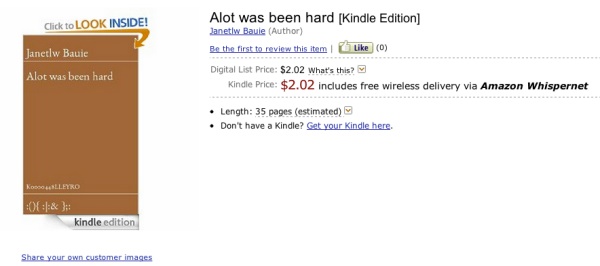
In 2013 the traditional book selling industry in the US produced 304,912 print titles that were distributed to bookstores such as Barnes and Noble or Books-a-Million. Fiction and Juvenile genres continued to dominate the market, accounting for over 27% of new titles.
Self-publishing on the other hand saw 458,564 titles that were produced that actually had ISBN numbers. Companies such as Amazon do not require ISBN numbers for authors to submit their eBooks into Kindle Direct Publishing. Amazon currently has 2.5 million eBooks for sale and 400,000 of them are courtesy of indie authors who opted into the program. In addition, over 300,000 titles were submitted by Smashwords to B&N and Kobo.
Barnes and Noble on the other hand has 2.5 million paid eBooks available and another 2 million free public domain editions for download. Self-published titles continue to grow on the Nook Platform and the company said they represent about 25% of all eBook sales on Nook devices and sales are growing roughly 20% each quarter.
You can look at the traditional book selling industry as employing Artificial Scarcity where they selectively choose books that will sell in the current market climate and investing in authors who have an extensive track history of generating perennial bestsellers. Few books slip through the cracks that would be considered elevated literary fiction, the type that wins the National Novel Award or the Man Booker Prize. Self-publishing on the other hand employs Organic Abundance with indie titles being generated at almost a 3:1 ratio vs print.
Print books have a fairly low shelf life, the average title is sitting inside of a bookstore for about three months before its cycled away for the next batch. Major publishers have embraced digital the last four years and they reap the lions share of revenue from all book sales on Amazon, B&N or Kobo. Self-publishers are seeing success on those platforms, as they are regularly in the top 100 bestselling books every week.
There are more eBooks being produced on a yearly basis from publishers and indie authors then at any point in human history. There simply is too much digital content that does not get cycled out, does not disappear, but remains perpetually available forever. Traditionally published and self-published books are stacked right next to each other, and there is no way to filter one or the other out. In the next few years millions of additional books will be published and submitted to Amazon, who despite themselves will make a ton of money, but at the further expense of book discovery and the quality of product.
I am hereby abandoning reading eBooks from this point forward. Something is fundamentally flawed with the entire online book discovery experience. There simply is too much content being generated for search engine algorithms to cope or to browse by subject matter. Instead, I am exclusively going to be visiting my local Chapters on a weekly basis and picking up a few good reads. At least the traditional book selling industry understands product placement, the psychology of color and makes finding a new book a social experience, rather than a solitary one.
Michael Kozlowski is the editor-in-chief at Good e-Reader and has written about audiobooks and e-readers for the past fifteen years. Newspapers and websites such as the CBC, CNET, Engadget, Huffington Post and the New York Times have picked up his articles. He Lives in Vancouver, British Columbia, Canada.